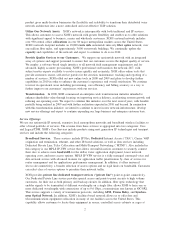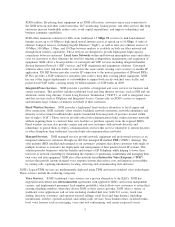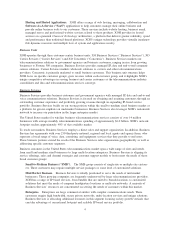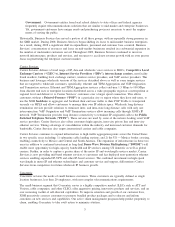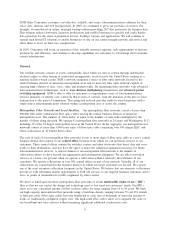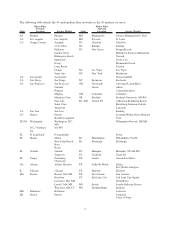XO Communications 2009 Annual Report Download - page 16
Download and view the complete annual report
Please find page 16 of the 2009 XO Communications annual report below. You can navigate through the pages in the report by either clicking on the pages listed below, or by using the keyword search tool below to find specific information within the annual report.with respect to any of Verizon’s requests. Accordingly, the Commission denied the requested relief in all six
MSAs. On January 14, 2008, Verizon filed an appeal in the United States Court of Appeals for the DC Circuit
(“DC Circuit”). On July 25, 2008, in a unanimous decision, the FCC adopted a Memorandum Opinion and
Order denying Qwest’s four petitions in their entirety. On July 29, 2008, Qwest filed an appeal of the FCC’s
decision with the United States Court of Appeals for the DC Circuit. We intervened in the appeals of the
FCC’s decisions in the Verizon and Qwest Forbearance cases in support of the FCC. On June 19, 2009, the
DC Circuit ruled on Verizon’s appeal, remanding to the FCC a very limited question regarding how the FCC
reached its rejection of the forbearance petitions — but not overturning the actual decision. While the Qwest
appeal is still pending in the DC Circuit, on July 17, 2009, the FCC asked the DC Circuit to remand the
pending Qwest appeal back to the FCC so that the issues in the Qwest forbearance case can be decided
simultaneously with the remand of the Verizon forbearance case. In addition, on March 24, 2009, Qwest re-
filed its petition for forbearance for the Phoenix market, citing greater intermodal competition since July 25,
2008 when the FCC rejected Qwest’s first petition for forbearance for the Phoenix market. The FCC asked
interested parties to file comments and reply on both the Verizon and Qwest remand docket as well as the
Qwest re-filed Phoenix petition by September 21, 2009 and October 21, 2009, respectively. It is not possible
to predict the outcome of, or potential effect upon, our operations of the pending Verizon and Qwest remand
docket or Qwest’s re-filed forbearance petition for the Phoenix market.
VoIP. Like a growing number of carriers, we use IP technology for the transmission of a portion of our
network traffic. The regulatory status and treatment of IP-enabled services is unresolved. The FCC has held
that Vonage’s VoIP services and similar offerings by other providers are subject to the FCC’s interstate
jurisdiction, preempting state efforts to regulate VoIP providers as intrastate telecommunications providers.
Four separate state commissions have appealed this ruling and the case is currently pending. On June 27,
2006, the FCC released an order holding that providers of “interconnected VoIP services” must contribute to
the Federal Universal Service Fund (“USF”), finding that such providers are “providers of interstate
telecommunications” under 47 U.S.C. 254(d) and also asserting its ancillary jurisdiction over such providers
under Title I of the Communications Act. The FCC, however, explicitly left open the question of whether
interconnected VoIP providers provide “telecommunications services” or enhanced “information services.”
Generally, telecommunications service providers, including traditional local and long distance telecommunica-
tions companies, are regulated under the Communications Act; information service providers are generally
unregulated. On June 1, 2007, the United States Court of Appeals for the DC Circuit upheld the FCC’s order
requiring VoIP providers to pay into the USF. The FCC has initiated a rulemaking proceeding to address the
classification of VoIP and other IP-enabled service offerings. It is not possible to predict the outcome of this
proceeding or its effect on our operations.
Intercarrier Compensation Reform and Treatment of VoIP Services. On July 8, 2008, the United States Court
of Appeals for the D.C. Circuit directed the FCC to either justify its intercarrier compensation rules for traffic
bound for ISPs or such rules will be vacated on November 6, 2008. Several interested parties filed various
proposals on how the FCC might justify its intercarrier compensation rules for ISP- bound traffic as well as
how the FCC may reform the entire intercarrier compensation and universal service fund regimes. We actively
participated at the FCC in response to those proposals. On November 5, 2008, the FCC released an Order
responding to the United States Court of Appeals for the DC Circuit specifically keeping the current ISP-
bound traffic rules in effect, including a $0.0007 cap on traffic above a 3:1 ratio. Also on November 5, 2008,
the FCC released a Further Notice of Proposed Rulemaking requesting comment on three alternative proposals
for reform of the intercarrier compensation and universal service rules. The three proposals include a proposed
draft order circulated by the FCC Chairman, a narrower draft addressing only USF reform issues, and a
revised version of the Chairman’s proposal that includes suggestions made by rural and wireless carriers as
well as consumer groups. The FCC has taken no action on the three proposals to date. On March 17, 2010, the
FCC released its National Broadband Plan which outlines a roadmap for the delivery of broadband to all
Americans. The Plan does not have the effect of law but is a blueprint for how the FCC may address various
issues. With respect to possible reform to intercarrier compensation, the FCC specifically recommended that
during the 2012-2016 timeframe, intrastate terminating switched access rate levels should be moved down to
interstate terminating switched access rate levels over a period of two to four years. In the 2017-2020
timeframe, the FCC should continue reducing intercarrier compensation rates by phasing out the per-minute
12


